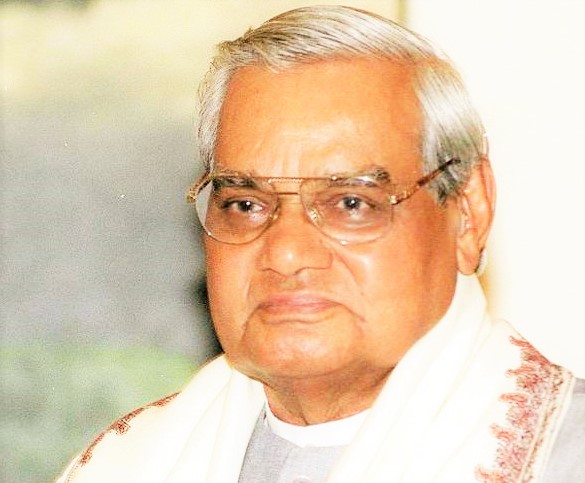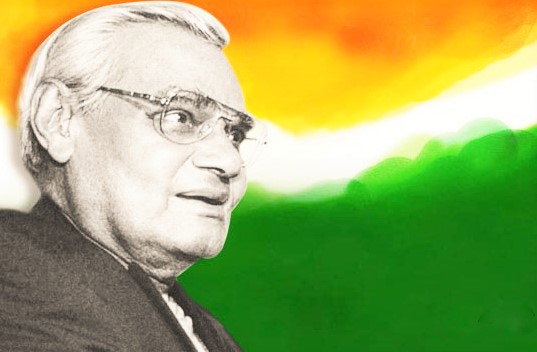Atal Bihari Vajpayee
 |
| Atal Bihari Vajpayee |
Atal Bihari
Vajpayee
(25 December 1924 - 16th August, 2009) was one of the leaders of the Bharatiya
Janata Party (BJP), who was known for his cultural solidarity, liberalism and
political logic. He has been the Prime Minister for three times - for the first
time in 1996 he worked for a 13-day period, in 1998 for the second time in
eleven months and for the third time in 1999, for the third time in five years.
During his tenure, India successfully conducted nuclear tests in Pokhran and
hoped for new peace to establish peace between India and Pakistan at the
beginning of the new Delhi-Lahore bus service. His government has been the only
non-Congress government to have power for five years. Along with being a late
politician and extraordinary parliament member, Atal Bihari Vajpayee was also a famous poet and a very popular
figure in the political spectrum.
Early life
Atal Bihari
Vajpayee
was born in the Brahmin family of middle class to near Mother Goddess Krishna
Devi and father Krishna Bihari Vajpayee, on 25th December, 1925, to Mother
Goddard (Madhya Pradesh). His father was a poet and school teacher. Saraswati Shishu
Mandir, from Gwalior, studied in the school. Later, while studying Victoria
College, Gwalior, he studied at Lakshmi Bai College. It was in the Dayanand
Anglo-Vedic College in Kanpur that Vajpayee completed his postgraduate studies
in Political Science.
In 1939 he joined the National Self-Work Association (RSS) as a lecturer, but in 1947 he became a lecturer (full-time worker). He worked for Hindi monthly, Rashtradharma Hindi monthly, five Hindi weekly and daily Swadesh and Veer Arjun.
Atal Bihari Vajpayee has been selected to be a graduate for whole life; he takes the daughter of long-time friend Rajkumari Kaul and BN Kaul and raised him as his child.
In 1939 he joined the National Self-Work Association (RSS) as a lecturer, but in 1947 he became a lecturer (full-time worker). He worked for Hindi monthly, Rashtradharma Hindi monthly, five Hindi weekly and daily Swadesh and Veer Arjun.
Atal Bihari Vajpayee has been selected to be a graduate for whole life; he takes the daughter of long-time friend Rajkumari Kaul and BN Kaul and raised him as his child.
Political career
Atal Bihari
Vajpayee
started his career in politics as a freedom fighter. Later, he was a Hindu
rightist political party, the Indian National Democratic Party (BJS), and more.
Shayma joined Prasad Mukhopadhyay. He was in charge of North Zone as National
Secretary of BJS.
As
the new leader of the BJS, in 1957, Barappey was elected for the first time for
public release. In 1968, he became the National President of the People's
Union. Supported by his colleague Nanadi Deshmukh, Baladha Madhup and LK
Advani, Vajpayee further glorified the Sangha.
In
1977, BJP leader John Sangha joined the whole revolution movement led by Jay
Prakash Narayan (JP) against the internal activities of Prime Minister Indira
Gandhi. Grand Alliance government against Indira Gandhi, part of Janata Party.
In
1975, Atol Bihari Vajpayee became
the Union minister, when the Janata Dal led by the Morarji Desai came to power.
He was Minister of Foreign Affairs in the Morarji Devi cabinet. As the Foreign
Minister, Vajpayee became the first person to present lectures at the United
Nations General Assembly in the United States. After the resignation of Morarji
Desai, his career as a minister in 1979 was incomplete. But since then he has
established himself as a political leader.In 1980, the Bharatiya Janata Party
formed with BJP and National Autonomous Organization (RSS), along with Lal
Krishna Advani, Bhairan Singh Sikha and others. After the fall of the Janata
Party government, Congress (I) became a strong critic of the government.
After
the assassination of Prime Minister Indira Gandhi in 1984, the Prime Minister
did not support Operation Blue Star against the anti-Sikh violence and gave two
of her Sikh bodyguards to her.
BJP won two parliamentary seats in the 1984 elections. The BJP president and opposition leader of the BJP, as the BJP president Known for his liberal outlook, Babari thought of destroying the mosque on December 6, 1992 and declared it as a "bad misconception" of the BJP.
BJP won two parliamentary seats in the 1984 elections. The BJP president and opposition leader of the BJP, as the BJP president Known for his liberal outlook, Babari thought of destroying the mosque on December 6, 1992 and declared it as a "bad misconception" of the BJP.
As Prime Minister of India
 |
| Atal Bihari Vajpayee |
In
the 1984 elections, in the Indian politics, BJP has established itself as an
important political party. After the general election of 1996, Vajpayee took
oath as the 10th Prime Minister of India, where the BJP emerged as the single
largest party in the Lok Sabha. However, after the fall of the government, within
13 days, after the fall of the government, the majority of the parties cannot
get the majority.
In 1998, the BJP-led coalition government came back to power as National Democratic Alliance (NDA). Again, sworn in as Prime Minister. On 1 May 1998, the name of the second term is mentioned as the prime minister's prime minister for the nuclear tests conducted in Pokhran desert in Rajasthan. Vajpayee pushed the peace process with Pakistan. He inaugurated Delhi-Lahore historian in February 1999. He said to settle the Kashmir dispute and settle disputes with Pakistan.
But
Pakistan launched the Kargil war, which India had defeated, where Pakistani
soldiers entered the Valley of Kashmir and attacked the Border Mountains around
Kargil town.
Under operation Vijay, the Indian Army unit, Pakistani infiltrators with heavy weapons, with heavy weapons, and hailstorms between the treacherous mountainous terrains and finally emerge as a winner. However, in mid-2012, All India Anna Dravida Munnetra Kazhagam (AAIADMK) withdrew support for the government for 13 months.
In the next election, the NDA came back to full majority and for the first time non-Congress was able to take over the charge of five years (1999-2004) as the Prime Minister. On October 13, 1999, Atal Bihari Vajpayee took the oath of office for the third time as Indian Prime Minister.
Under operation Vijay, the Indian Army unit, Pakistani infiltrators with heavy weapons, with heavy weapons, and hailstorms between the treacherous mountainous terrains and finally emerge as a winner. However, in mid-2012, All India Anna Dravida Munnetra Kazhagam (AAIADMK) withdrew support for the government for 13 months.
In the next election, the NDA came back to full majority and for the first time non-Congress was able to take over the charge of five years (1999-2004) as the Prime Minister. On October 13, 1999, Atal Bihari Vajpayee took the oath of office for the third time as Indian Prime Minister.
But
in its third term, India is giving India terror to the terrorists. In December
1999, a flight IC 814 from Indian Airlines flight from Delhi to Kathmandu was
hijacked from Kandahar to Afghanistan. To ensure the freedom of the passengers,
the government had to release the terrorists from prison including Maulana
Masood Azhar. On the bright side, the Vajpayee government introduced many
economic and infrastructure reforms, of which there was encouragement to
private sector and foreign investment. It also conducts National Highway
Development Project and Prime Minister's Rural Roads Plan. Bappi took the path
of business, trade and open market reform for economic development of India.
In March 2000, during the visit of US President Bill Clinton, Vajpayee signed a document of historic visas. In addition to pitching for expansion of trade and economic relations between the two countries, there were some strategic issues in the announcement.
Kashmir Chief Minister Mamata Banerjee and her party meet with the Pakistan People's Party (PPP) leader Muammar Gaddafi.
When the Pakistan-backed terrorists attacked the parliament building in Delhi on December 23, 2013, the Atal Bihari Vajpayee government attacked the Indian Parliament. Ultimately, their efforts by the Indian security forces failed.
After the Gujarat riots in 2002, when the clash broke out in the Gujarat riots, the Prime Minister as the Prime Minister was the candidate for the election.
In March 2000, during the visit of US President Bill Clinton, Vajpayee signed a document of historic visas. In addition to pitching for expansion of trade and economic relations between the two countries, there were some strategic issues in the announcement.
Kashmir Chief Minister Mamata Banerjee and her party meet with the Pakistan People's Party (PPP) leader Muammar Gaddafi.
When the Pakistan-backed terrorists attacked the parliament building in Delhi on December 23, 2013, the Atal Bihari Vajpayee government attacked the Indian Parliament. Ultimately, their efforts by the Indian security forces failed.
After the Gujarat riots in 2002, when the clash broke out in the Gujarat riots, the Prime Minister as the Prime Minister was the candidate for the election.
Retire
 |
| Atal Bihari Vajpayee |
NDA
collapsed in the 2004 general elections, which lost nearly half of the seats
and the Congress-led United Progressive Alliance (UPA) rebuilt power.
Opposition leader, led by BJP leader LK Advani, refused to step down.
Death
 |
| Atal Bihari Vajpayee |
Even
after suffering a stroke in 2002, Vajpayee's main health issue has become a
major concern since his speech was hampered, after which he was limited to
wheelchairs and failed to recognize the people. Vajpayee was suffering from
diabetes and dementia. On June 11, 2011, her health condition worsened and she
was admitted to ATM Hospital in Delhi. After getting admitted for more than two
months, due to illness for a long time, at 11am 2018 morning, at 5:30 in the
village Atal Bihari Vajpayee died.
Awards and achievements
·
Padma Vibhushan in 1992
·
D. Lit. from Kanpur University in 1993
·
Lokmanya Tilak Award in 1994
·
Best Parliamentarian Award in 1994
·
Bharat Ratna in 2015
·
Liberation War award (Bangladesh Muktijuddho Sanmanona) in 2015


No comments:
Post a Comment